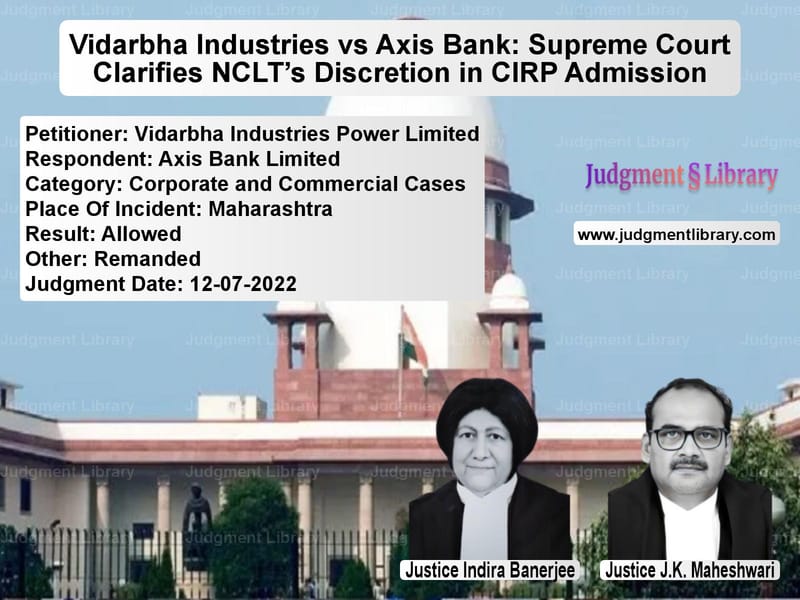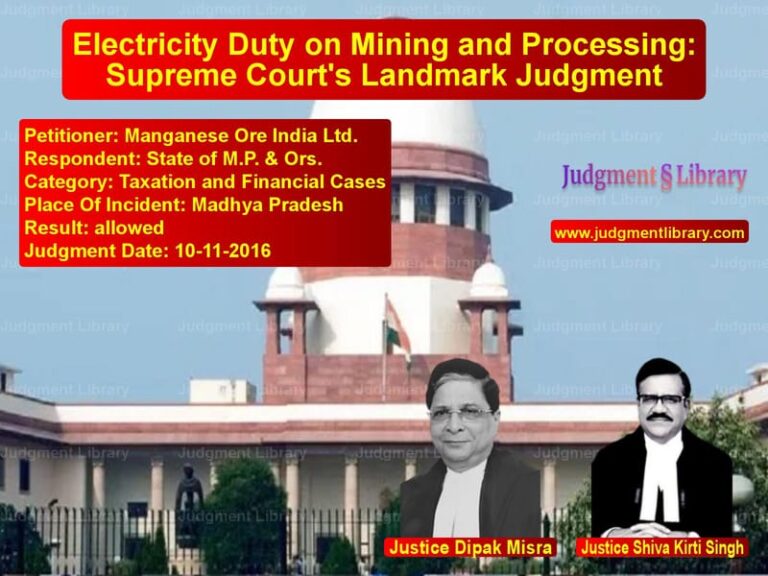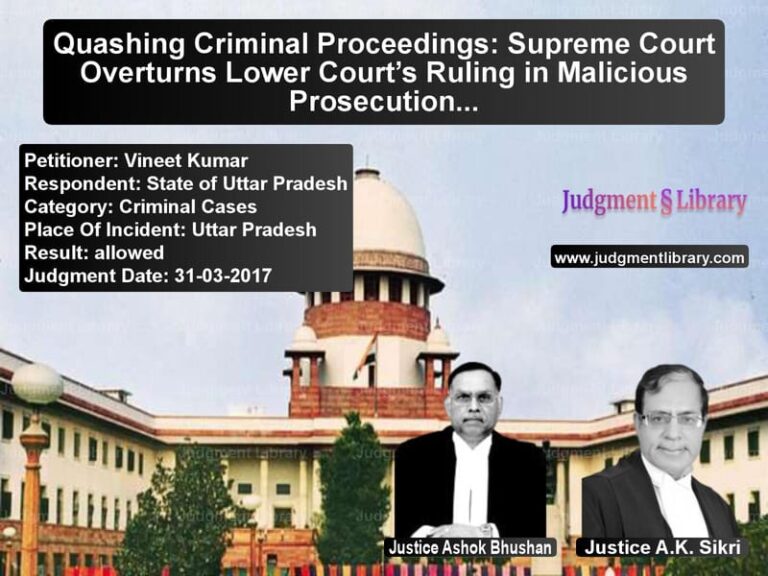Vidarbha Industries vs Axis Bank: Supreme Court Clarifies NCLT’s Discretion in CIRP Admission
The case of Vidarbha Industries Power Limited vs. Axis Bank Limited is a landmark judgment concerning the interpretation of Section 7(5)(a) of the Insolvency and Bankruptcy Code, 2016 (IBC). The Supreme Court of India clarified whether the National Company Law Tribunal (NCLT) is bound to admit a Corporate Insolvency Resolution Process (CIRP) application upon the establishment of a financial debt and default or whether it has the discretion to evaluate the circumstances of the corporate debtor before admitting the application.
The judgment is crucial in determining the scope of judicial discretion in insolvency proceedings and balancing the interests of financial creditors with those of corporate debtors who may be facing temporary financial constraints rather than insolvency.
Background of the Case
Vidarbha Industries Power Limited (VIPL) is a power-generating company that had entered into agreements for electricity production and distribution. Due to regulatory constraints and pending payments from a regulatory order, VIPL faced financial difficulties. Axis Bank Limited, one of its financial creditors, initiated CIRP under Section 7 of the IBC before the NCLT, Mumbai, claiming an outstanding amount of Rs. 553 crores. VIPL sought a stay on the proceedings, arguing that its financial distress was temporary and dependent on pending regulatory dues amounting to Rs. 1,730 crores.
The NCLT, however, rejected VIPL’s plea, stating that once financial debt and default were established, the admission of a CIRP application was mandatory. The National Company Law Appellate Tribunal (NCLAT) upheld this decision, leading VIPL to appeal to the Supreme Court.
Key Legal Issues
- Does Section 7(5)(a) of the IBC mandate the NCLT to admit a CIRP application upon establishing financial debt and default?
- Does the word “may” in Section 7(5)(a) grant the NCLT discretion to reject or delay CIRP proceedings based on additional considerations?
- Should the NCLT consider external factors, such as pending regulatory payments, before admitting a CIRP application?
Arguments Presented
Petitioner (VIPL):
- VIPL argued that the default was temporary and not indicative of insolvency. The pending regulatory appeal before the Supreme Court, if decided in its favor, would enable the company to clear all dues.
- It contended that Section 7(5)(a) of the IBC uses the word “may,” which signifies that the NCLT has discretion in admitting a CIRP application.
- VIPL cited its importance as an electricity provider, highlighting that its viability and continued operation were in the larger public interest.
Respondent (Axis Bank):
- Axis Bank argued that the IBC is a time-sensitive framework designed to provide financial creditors with a straightforward mechanism to recover dues from defaulting debtors.
- It stated that once financial debt and default are established, the NCLT is obligated to admit the CIRP application.
- The bank relied on past Supreme Court rulings such as Swiss Ribbons Pvt. Ltd. v. Union of India to assert that financial creditors have the right to initiate insolvency proceedings without undue delay.
Supreme Court’s Observations
The Supreme Court analyzed the legislative intent behind Section 7(5)(a) and noted the distinction between financial creditors and operational creditors under the IBC. The Court observed that:
- The use of the word “may” in Section 7(5)(a) indicates that NCLT has discretion and is not bound to admit a CIRP application automatically.
- Financial debt and default give a financial creditor the right to apply for CIRP, but this does not translate into an obligation for the NCLT to admit every such application.
- Pending regulatory payments, if realized, could significantly alter the financial position of VIPL, and the NCLT should have taken this into account.
- The IBC is intended for genuine insolvency resolution and should not be used as a recovery mechanism for financial creditors.
The Court ruled that the NCLT and NCLAT had erred in their interpretation of Section 7(5)(a) and set aside their decisions. It directed the NCLT to reconsider VIPL’s request for a stay on CIRP proceedings by evaluating all financial circumstances, including pending regulatory dues.
Read also: https://judgmentlibrary.com/supreme-court-clarifies-limitation-period-for-initiating-cirp-under-ibc/
Impact of the Judgment
- This judgment provides relief to corporate debtors who face temporary financial distress due to external factors beyond their control.
- It ensures that CIRP is initiated only when insolvency is imminent, rather than being used as a coercive tool by financial creditors.
- The ruling establishes that NCLT has the authority to consider broader financial aspects before admitting CIRP applications, promoting fairness in insolvency proceedings.
The Supreme Court’s decision in this case serves as a precedent for future cases where corporate debtors argue against automatic admission of CIRP applications based on temporary financial distress rather than genuine insolvency.
Petitioner Name: Vidarbha Industries Power Limited.Respondent Name: Axis Bank Limited.Judgment By: Justice Indira Banerjee, Justice J.K. Maheshwari.Place Of Incident: Maharashtra.Judgment Date: 12-07-2022.
Don’t miss out on the full details! Download the complete judgment in PDF format below and gain valuable insights instantly!
Download Judgment: vidarbha-industries-vs-axis-bank-limited-supreme-court-of-india-judgment-dated-12-07-2022.pdf
Directly Download Judgment: Directly download this Judgment
See all petitions in Bankruptcy and Insolvency
See all petitions in Corporate Compliance
See all petitions in Company Law
See all petitions in Judgment by Indira Banerjee
See all petitions in Judgment by J.K. Maheshwari
See all petitions in allowed
See all petitions in Remanded
See all petitions in supreme court of India judgments July 2022
See all petitions in 2022 judgments
See all posts in Corporate and Commercial Cases Category
See all allowed petitions in Corporate and Commercial Cases Category
See all Dismissed petitions in Corporate and Commercial Cases Category
See all partially allowed petitions in Corporate and Commercial Cases Category







